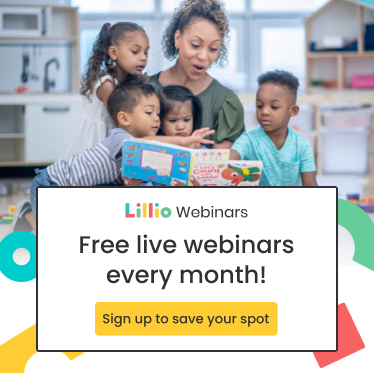How to build meaningful relationships with staff: Tips for leaders
As I stepped into a leadership role for the first time, I quickly realized it would be the scariest leap of my professional career. Leadership can feel like such a broad and stale term when we aren’t sure how to connect with the people we are meant to lead. I found myself wondering how my team members would respond to my leadership style… Do I even have a leadership style yet? What is it? Would I be able to handle the challenges leaders and child care professionals inevitably face? What about when I made a mistake, would my team of early childhood educators still trust me? Do I even know how to lead?

In facing my fears, I had to do a little professional development. To start, I would force myself to reflect back on examples throughout my life when I had naturally engaged in leadership. I had previously taken rein on group projects in school, and always made space for the ideas of everyone in my group. I had encouraged creative thinking daily for twenty-four children when I worked in the early childhood workforce as a preschool educator. I had been peer nominated and elected, on multiple occasions throughout my academic career, into student leadership roles. Heck, I led groups of energized children through intense activities as a birthday party host during the weekends while obtaining my Bachelor of Arts!
As I engage with leadership now in a more intentional way, I have been able to ponder on what practices work best to build meaningful relationships with early childhood professionals when you are a leader to a group of diverse individuals. Let me share some of those learnings with you…

Do engage with your team
Foster human connections on your team. Try to secure 1 on 1 meetings with individuals on your team consistently. Allow space for them to speak on concerns or offer ideas, while also leaving room for personal stories and anecdotes. Take this time to actively listen and make the effort to connect on a more intimate level.
Work to build strong relationships through curiosity and empathy. Be curious about what makes your team tick at home as much as at work, and be equally curious about what makes them smile!
When you are genuinely working to build better relationships, it instinctively establishes trust. The more your team trusts you, the more likely they will be willing to put in that little extra effort that can help your teachers succeed.
Don’t put yourself on an island
Ask your teachers for their opinions prior to making changes. Even if the changes made end up not being what they suggest, the value to the relationship will come from you asking in the first place. Running a high-quality early childhood program requires a partnership with your staff.
Include them in decisions. When possible, go beyond asking for an opinion, and have a strong peer leader join meetings or discussions with you and help support you as you make decisions that impact their role.
Delegate tasks! The early childhood educators at your center are professionals with unique skills and gifts; leverage their superpowers! You are not a leader if you work entirely in isolation, who are you leading if you’re working alone?
Do celebrate and embrace employees
Recognize and celebrate your teachers milestones and life events. Send them a congratulatory card for getting engaged, take them to lunch for their work anniversary, or gift a personalized basket for the holidays. There are countless ways to show your staff you value them as humans, from written messages of gratitude to more grand gestures.
These moments of recognition help create a sense of inclusion and belonging. “In fact, a SHRM/Workhuman survey found employees are 64% more likely to say their company is a good place to work if they are very or somewhat satisfied with how life events are celebrated” (Mosley, 2020).
By rewarding your teachers with recognition when they emulate behaviours you want the entire team to adopt, you are creating and reinforcing an early childhood environment built for success!

Don’t be a closed book
Offer access to the human inside the leader; your teachers look to you for honesty and transparency. If you don’t show some of this in relation to your personal life, it will be harder for them to accept it professionally.
Show humility. None of us are perfect. Freely admit mistakes and be an example of accountability and growth.
Reflect frequently. How you lead, your working style, and how you desire to be communicated with are crucial to know for yourself, and to relay to your team!
Set an example for other leaders by being a leader to your fellow leaders. We can all learn from each other’s leadership styles and approaches. Leadership is much more challenging when you feel that you’re doing it on your own.
Click here to learn more about how Lillio can support you in streamlining your center operations and giving your teachers time back in their day!
Do be predictable and consistent
Showing up in a way that is familiar to your team builds trust. If they do not know how to anticipate your reaction they may feel on edge around you.
Be open to feedback; supply both direct and anonymous forums for your team to provide insights regarding your impact as a leader. Show humility as you address any feedback, and employ (where possible/necessary) new approaches, or host conversations.
Have your team’s back! When things go wrong (which they will) seek to understand first, don’t jump to conclusions – assume best intent.

Do offer professional tools that save your educators time and support their work-life balance
Invest in a childcare management software that will streamline all administrative tasks, documentation and tuition collection into one platform. Using professional tools will reduce workload for your educators, allowing them to save time, focus more on their core responsibilities and spend less time on paperwork.
Burnout is common with early childhood professionals. Provide resources or workshops on time management and stress reduction techniques to help your educators maintain a healthy work-life balance.
Regularly assess and adjust workload expectations to ensure that your educators are not overwhelmed and have the necessary support and resources to achieve work-life balance.

Do engage in and offer professional development opportunities
Encourage continuous learning and growth among your team members by providing access to workshops, seminars, and other relevant professional development opportunities. Professional development and online trainings improve teacher effectiveness and satisfaction, as well as enhance children’s learning and improve relationships with families.
Foster a culture of skill development and career advancement by supporting staff in pursuing certifications and higher education.
Lead by example by actively participating in professional development activities and demonstrating the value of lifelong learning in the early childhood workforce.

I have had the honour of having knowledgeable, passionate leaders to mentor me as I made that oh-so-scary leap I spoke of earlier. Each day I learn something new, and leading gets a little less scary. However, leadership roles are not for the faint of heart, and there will always be an element of risk and vulnerability that makes being a leader both daunting and thrilling.
What inspires me to continue leading, and to continue my efforts to grow as a leader, are the incredible humans who came before me. I think of everyone from world leaders whose quotes energized me, to the high school teachers who pushed me to challenge myself, to my mother who unknowingly guided me through motherhood through leading by example. All of these humans lit a fire in me to push myself to new limits and achieve the unachievable. If any of us can help to light that fire in just one soul, the risks and challenges of leadership will fade to the background.
Work Cited:
Mosley, E. (2020, February 18). How managers can foster more meaningful relationships at work. Forbes. https://www.forbes.com/sites/ericmosley/2020/02/18/how-managers-can-foster-more-meaningful-relationships-at-work/?sh=85d71b48bb12
Click here to learn more about how Lillio can give you time back in your day to be a present and people first leader for your team!


Kayla is a mother to a toddler and was born and raised in Toronto, Ontario. She entered into the child care space at a young age; first, as a volunteer at before and after school programs, and then as a youth mentor, tutor, and reading buddy at various organizations. Kayla went on to receive her Bachelor of Arts Honours In Drama and Criminology from the University of Windsor in 2013. She then reentered the child care space as an assistant director of a school age program and later as a preschool teacher. In 2018 Kayla returned to school and achieved a 4.0 in the Master of Education program at OISE, University of Toronto. Kayla studied Curriculum Studies & Teacher Development with emphasis in Arts in Education, STEM Education, and Critical Pedagogy (focus on anti-oppressive approaches to education). Kayla has helped organize conferences such As the AAACS (American Association for the Advancement of Curriculum Studies) and has now joined the Lillio team and helps support educators with relevant & applicable professional development content.
More by Kayla

Kayla Warburton
April 9th, 2024
8 mins

Related Articles

5 Common Myths About Collecting Tuition Payments Online
February 20th, 2025 | Missy Knechel

